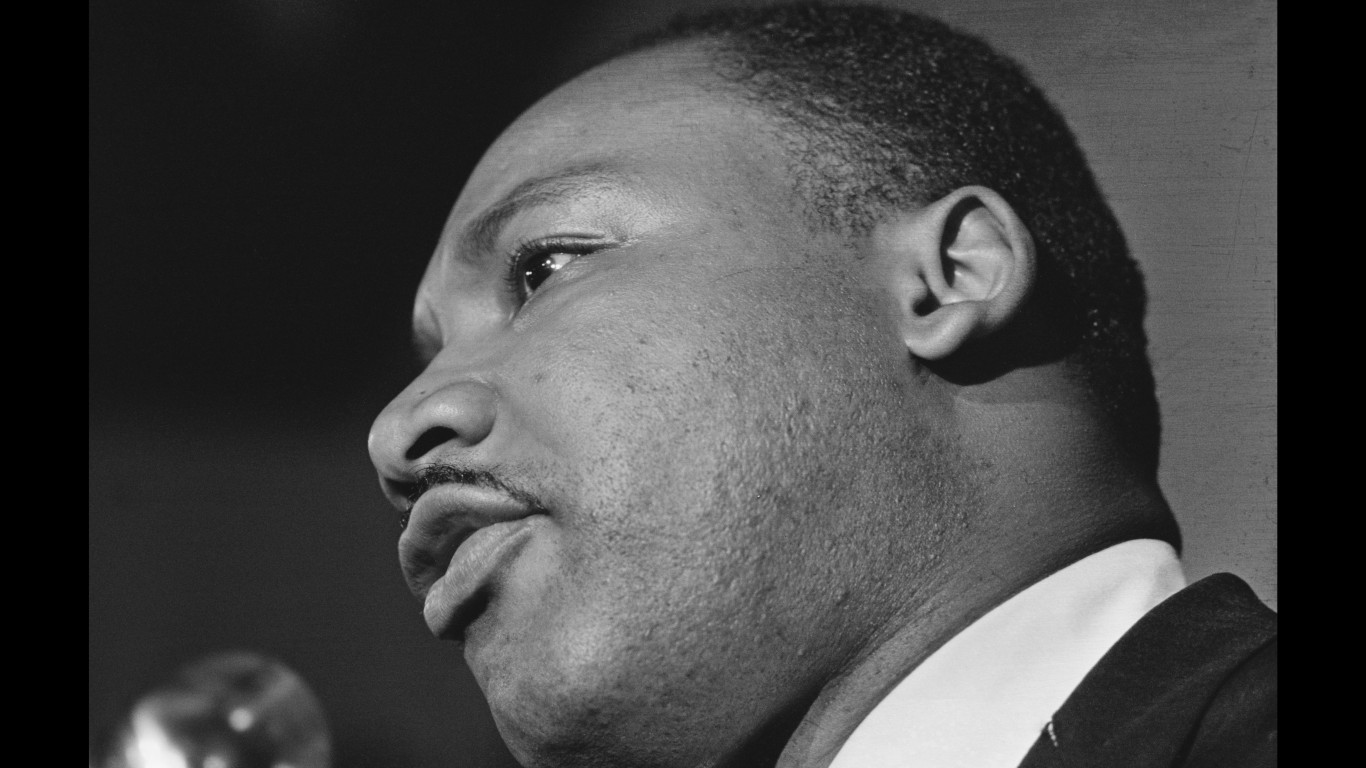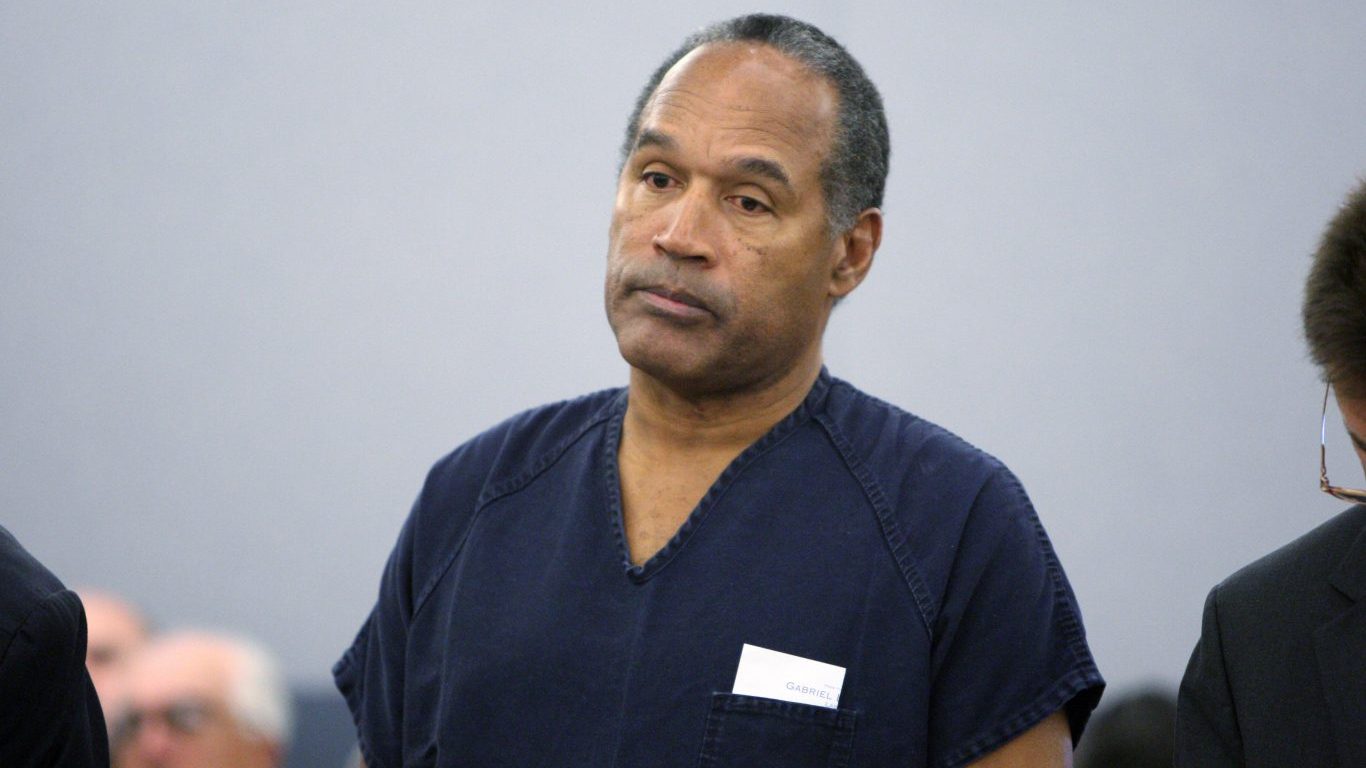
Growing up, many people dream of making it as a professional athlete. It is seen as a quick path to wealth and a comfortable life after retirement. But athletes face issues like anyone else, including substance abuse and financial struggles.
Often, these issues can spiral into dangerous and destructive behavior. Many players have no experience handling large amounts of money before signing their first pro contract, and this can get them into trouble. Others, no matter how gifted they are, can’t handle the instant fame and wealth of being a high draft pick and turn to drugs and alcohol, which can rob them of their potential. These are the biggest draft busts in the history of sports.
24/7 Wall St. reviewed past news stories to determine a list of famous athletes who ended up in prison.
This list is by no means comprehensive. Dozens of athletes across the four major U.S. sports leagues have been arrested and convicted of just about every criminal charge imaginable. Some players were included because their crimes were just so bizarre or heinous that they grabbed headlines. Others were spectacular athletes in the prime of their careers who lost it all because of their off-field activity. Many of these players may have cost themselves a Hall of Fame induction. These are the teams with the most Hall of Famers.
Like many convicts, some players who receive extended prison sentences don’t actually serve the entire sentence. Some get out earlier because of good behavior, or they are released into a halfway house, or they are released but remain on parole.
Many of the athletes on this list are football players. It seems that NFL players are often in the news for legal infractions, whether minor or very serious. This may simply be because there are more than 50 players on a given NFL roster — a much higher total than any other sport. But others have theorized that the sport itself is causing some of these issues.
Former NFL player Aaron Hernandez was convicted of murder and took his own life in prison at age 27. Boston University researchers found he had a severe form of CTE — chronic traumatic encephalopathy, a condition associated with repeated head trauma that is often found in football players. CTE can affect the parts of the brain associated with impulse control, emotions, and fear. This may mean the condition is at least partially to blame in some cases of violent behavior in some athletes.
Click here to see famous athletes who ended up in prison.
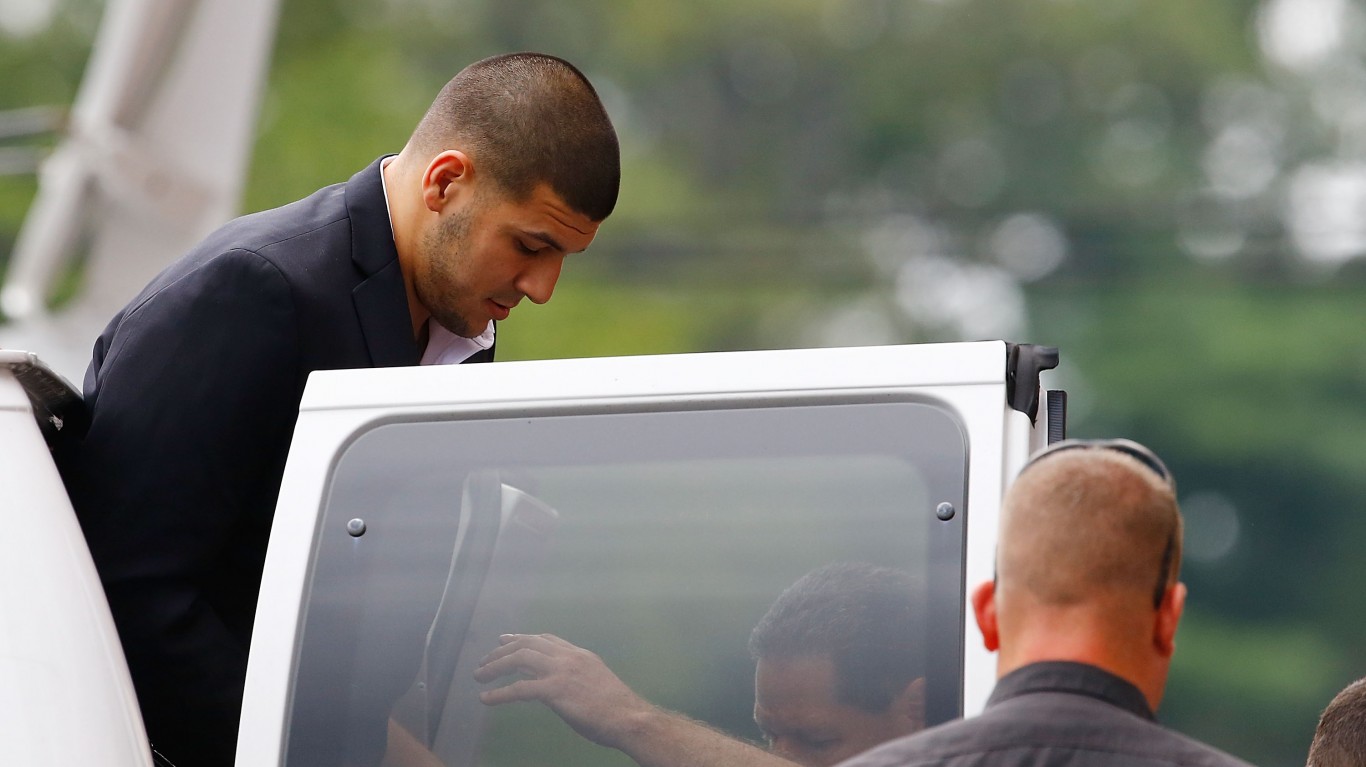
Aaron Hernandez
> Team(s): New England Patriots
> Convicted of: First-degree murder
> Arrested in: 2013
> Sentence: Life in prison
Just before he was set to begin his fourth NFL season, New England Patriots tight end Aaron Hernandez was arrested and charged with first-degree murder. Hernandez was eventually convicted of killing his once-friend Odin Lloyd. Hernandez took his own life in a Massachusetts prison in 2017. After he died, Hernandez’s conviction was briefly vacated, as he was appealing his case, but the verdict was reinstated in 2019.
[in-text-ad]
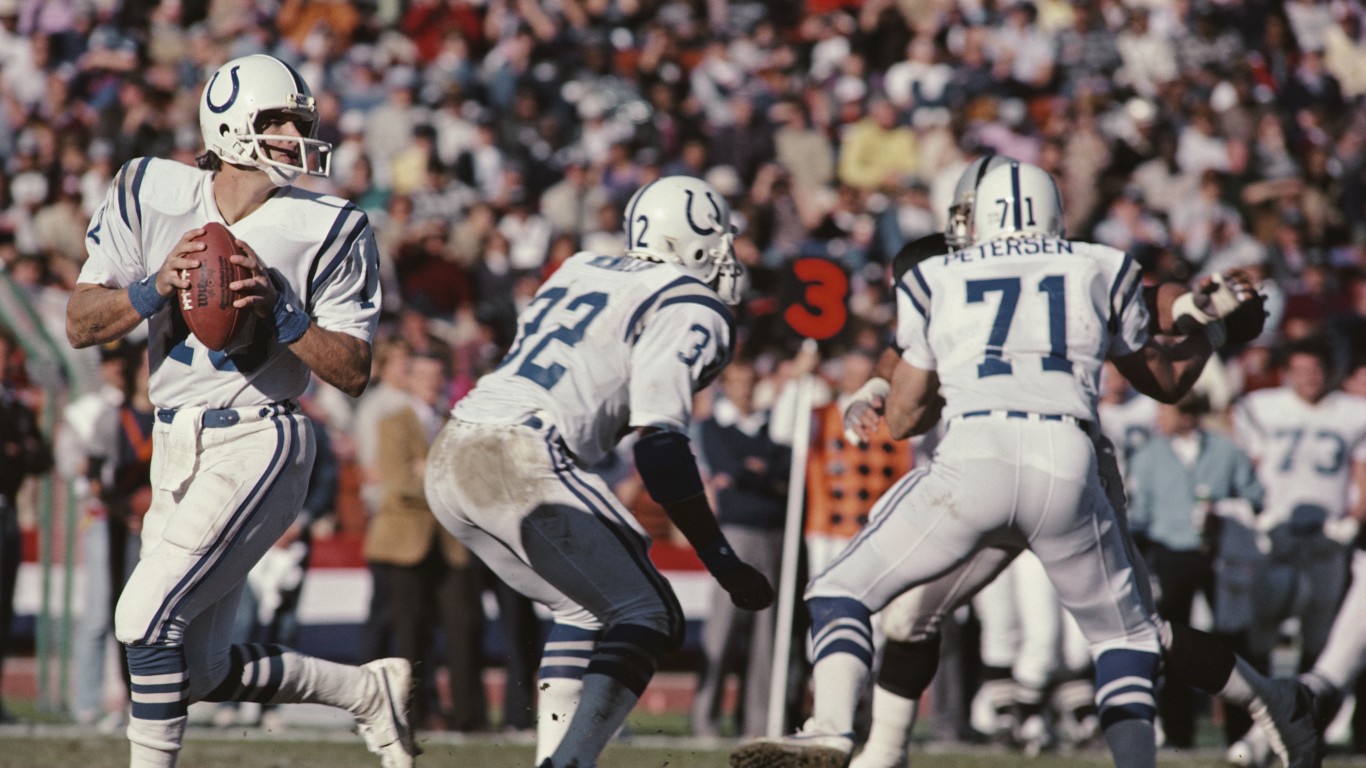
Art Schlichter
> Team(s): Indianapolis Colts
> Convicted of: Fraud
> Arrested in: 2012
> Sentence: 127 months
Art Schlichter was a promising quarterback who lost his career primarily because of his gambling addiction. After leaving Ohio State, Schlichter went to the Baltimore Colts as the fourth overall pick in the 1982 NFL Draft. He missed all of 1983 because of a gambling suspension from the NFL. In 1987, Schlichter was arrested for being part of a multi-million dollar illegal sports gambling ring. He has been to prison on and off since then, including in 2012, when he pled guilty to helping sell fake sports tickets and tested positive for cocaine while awaiting sentencing. Schlichter is currently scheduled to be released from prison in 2020.
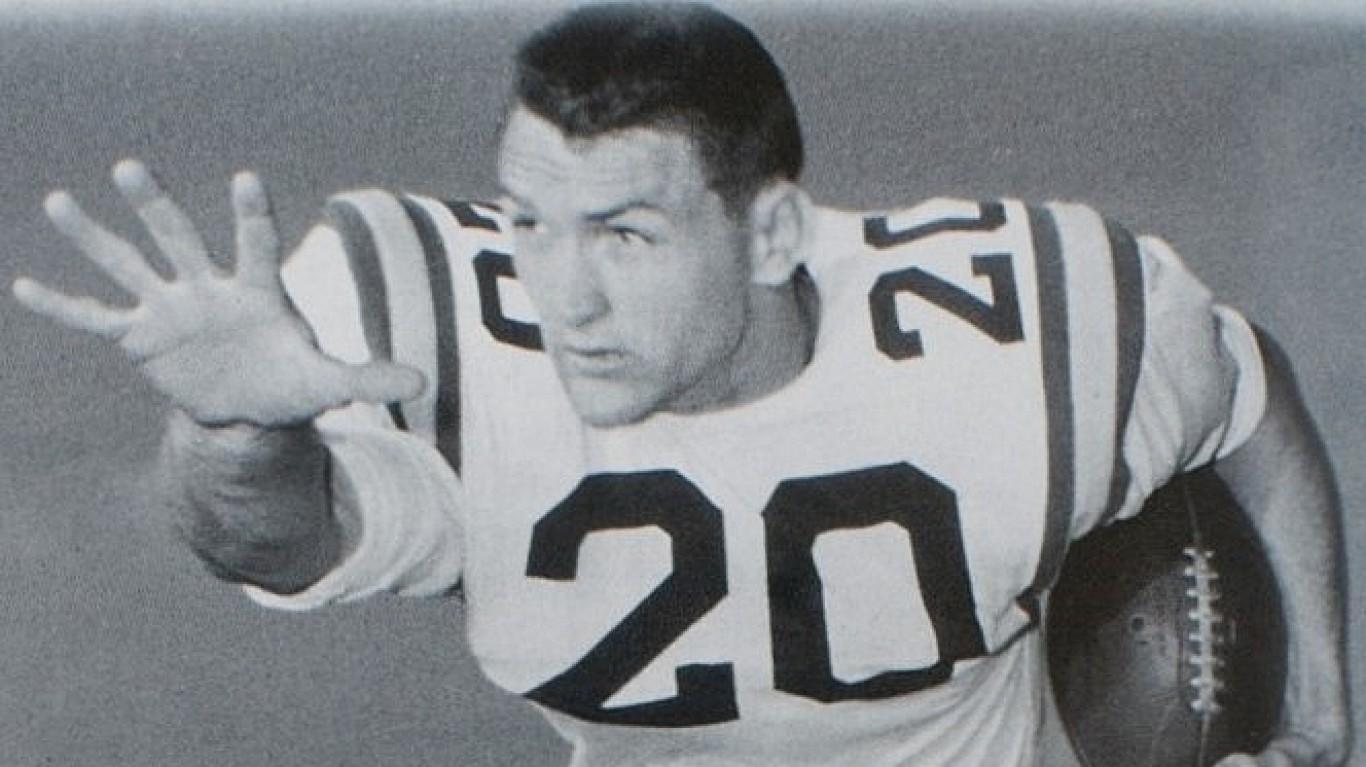
Billy Cannon
> Team(s): Houston Oilers, Oakland Raiders
> Convicted of: Conspiracy, possession of counterfeit money
> Arrested in: 1983
> Sentence: 5 years
Billy Cannon was the 1959 Heisman Trophy winner for LSU before going on to be the top overall draft pick in the 1960 NFL Draft. He spurned the NFL in favor of the upstart AFL — and a six-figure contract worth more than double what he would have earned in the NFL. He played pro football for 11 seasons, making two Pro Bowls, two All-Pro teams, and winning three AFL titles.
Cannon, despite running a thriving dental practice in his retirement, reportedly lost much of his money on gambling debts and bad investments and turned to crime. In 1983, he was arrested and discovered to have millions in counterfeit $100 bills. Cannon pled guilty to conspiracy and served three years of a five-year sentence.

Craig MacTavish
> Team(s): Boston Bruins, Edmonton Oilers
> Convicted of: Vehicular manslaughter
> Arrested in: 1984
> Sentence: 1 year
They say crime doesn’t pay, but in the case of Craig MacTavish, crime had little effect on his NHL career. In January of 1984, MacTavish, then with the Boston Bruins, drunkenly got into a car accident that killed a 26-year-old woman in Massachusetts. MacTavish received a one-year prison sentence and missed the 1984-1985 season. After being released, he signed with the two-time defending champion Edmonton Oilers. MacTavish won three Stanley Cups in Edmonton and another with the New York Rangers. All in all, he played 12 more seasons after getting out of prison.
[in-text-ad-2]

Darryl Strawberry
> Team(s): New York Mets, New York Yankees
> Convicted of: Cocaine possession
> Arrested in: 1999
> Sentence: 18 months
Darryl Strawberry is just one of the several members of the famous 1986 World Series champion New York Mets who struggled with legal issues and substance abuse. In 1999, as his career wound down, Strawberry reportedly solicited sex from an undercover police officer. The officer searched Strawberry and found cocaine in his wallet. He received probation but violated the terms when he tested positive for the drug in 2000. Strawberry eventually served 11 months of an 18-month term. He now says he is clean and uses his experience to provide guidance to others with substance abuse issues. He is a recently retired member of the Substance Abuse and Mental Health Services Administration National Advisory Council.
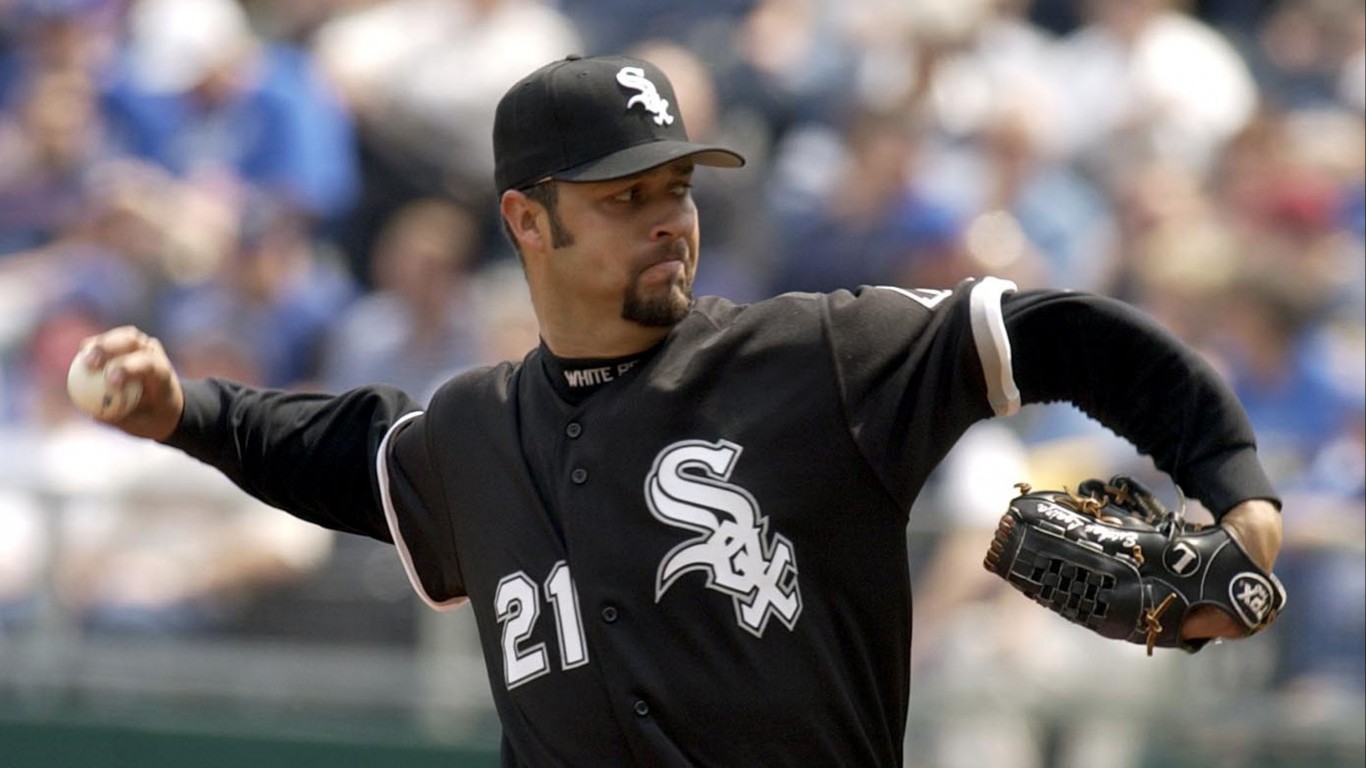
Esteban Loaiza
> Team(s): Pittsburgh Pirates, Chicago White Sox
> Convicted of: Drug possession
> Arrested in: 2018
> Sentence: 3 years
Esteban Loaiza was a long-tenured, well-traveled starting pitcher, playing for eight teams in 14 seasons beginning in 1995 and making two All-Star teams. In 2018, he was arrested in California after police found more than 40 pounds of cocaine in a secret compartment in his minivan. Loaiza was sentenced to three years in prison and will be deported to Mexico after serving his time.
[in-text-ad]
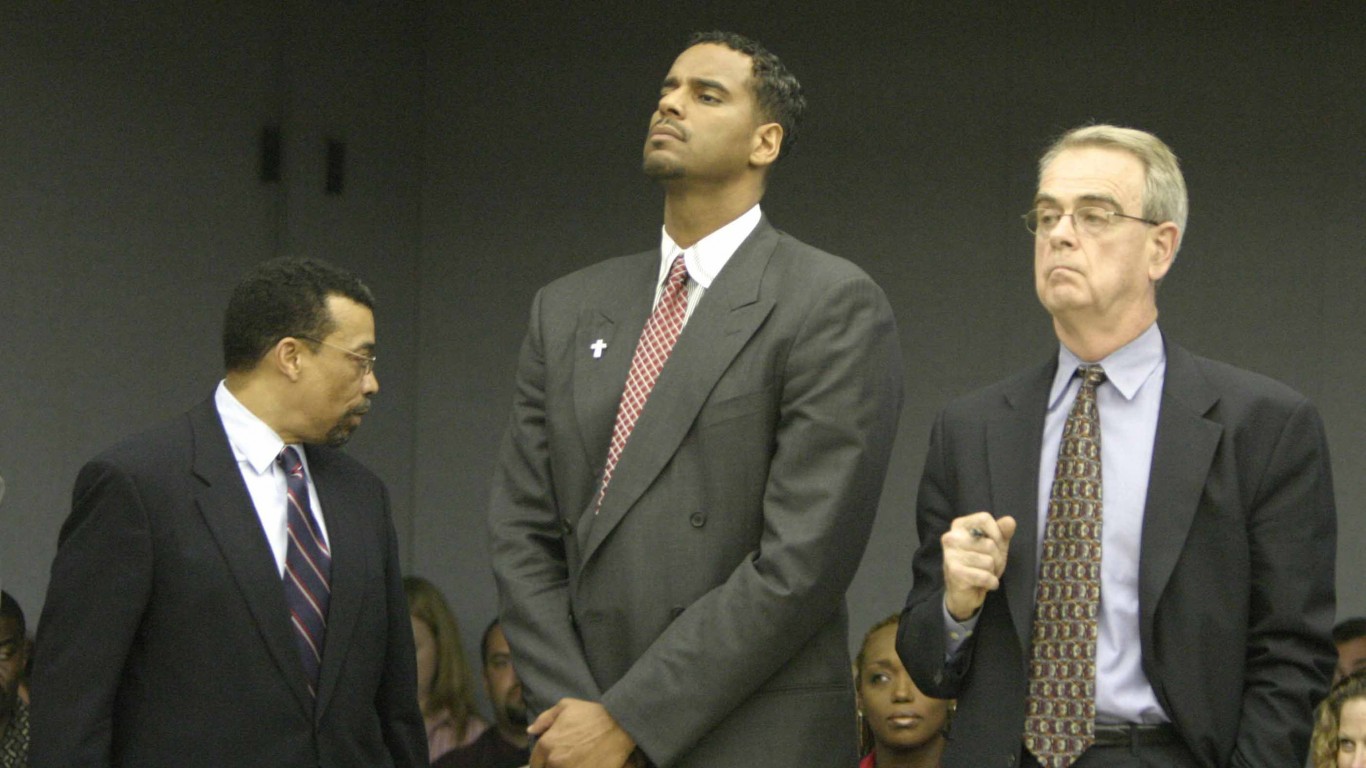
Jayson Williams
> Team(s): New Jersey Nets
> Convicted of: Aggravated assault, DUI
> Arrested in: 2002
> Sentence: 5 years
Jayson Williams’ story may be one of the most bizarre and tragic in sports. An NBA All-Star, his career ended suddenly after he suffered a broken leg in 1999. In 2002, Williams was showing off a shotgun to his chauffeur, Costas “Gus” Christofi, and some friends when the gun went off, striking and killing Christofi. Some of those present testified that Williams told them to help him cover up the shooting. After lengthy criminal proceedings, Williams was sentenced in 2010 to five years in prison after pleading guilty to aggravated assault. He served 18 months. He also served an eight-month sentence stemming from a DUI arrest.

Lenny Dykstra
> Team(s): New York Mets, Philadelphia Phillies
> Convicted of: Grand theft auto, bankruptcy fraud, indecent exposure
> Arrested in: 2011
> Sentence: 3 years
Since hanging up his cleats, former Mets and Phillies star Lenny Dykstra has frequently been in the news for criminal issues. In 2012, he was sentenced to three years in prison after using a fake business to claim he had the credit to lease high-end cars. Separately, Dykstra was also convicted of bankruptcy fraud after selling a property that was part of his bankruptcy estate, and he served over six months in prison. Dykstra has faced numerous harassment allegations and received a nine-month sentence for indecent exposure after using Craigslist to lure women who answered an ad for housekeeping work. In 2018, Dykstra was charged with making terroristic threats and for several drug offenses after police said he pulled a gun on an Uber driver.

Matt Bush
> Team(s): Texas Rangers
> Convicted of: DUI, leaving the scene
> Arrested in: 2012
> Sentence: 4 years, 3 months
Matt Bush’s career very nearly ended before it started. Drafted first overall in the 2004 MLB draft by the San Diego Padres, Bush had a string of alcohol-related incidents that culminated in a 2012 arrest for DUI and leaving the scene of an accident with bodily injury after running over a motorcyclist. The motorcyclist survived but lives with permanent struggles from the accident. Bush was sentenced to 51 months in prison. After being released to a halfway house, an employee of the Texas Rangers saw Bush throwing 95 mph behind his restaurant job and gave him another shot. Bush, now sober, made it to the big leagues where he has been a solid relief pitcher for the Rangers.
[in-text-ad-2]

Mercury Morris
> Team(s): Miami Dolphins
> Convicted of: Cocaine trafficking
> Arrested in: 1982
> Sentence: 3 years
Mercury Morris is perhaps best remembered as the starting running back on the undefeated 1972 Miami Dolphins team. After retirement, Morris was arrested in a 1982 cocaine bust. He was initially convicted on four charges related to drug trafficking. After three years, Morris’s appeals succeeded and his conviction was overturned. He then pled no contest to one charge, sentenced to time served, and released.

Michael Vick
> Team(s): Atlanta Falcons, Philadelphia Eagles
> Convicted of: Conspiracy
> Arrested in: 2007
> Sentence: 23 months
The NFL was stunned in 2007 when authorities raided a property belonging to superstar QB Michael Vick and found dozens of pit bulls and evidence of a dog-fighting ring. Vick’s three co-defendants told prosecutors that Vick funded the ring, known as Bad Newz Kennels, and even killed some dogs himself in gruesome fashion. Vick was sentenced to 23 months in prison and was released in 2009. After his release, Vick played seven more NFL seasons.
[in-text-ad]
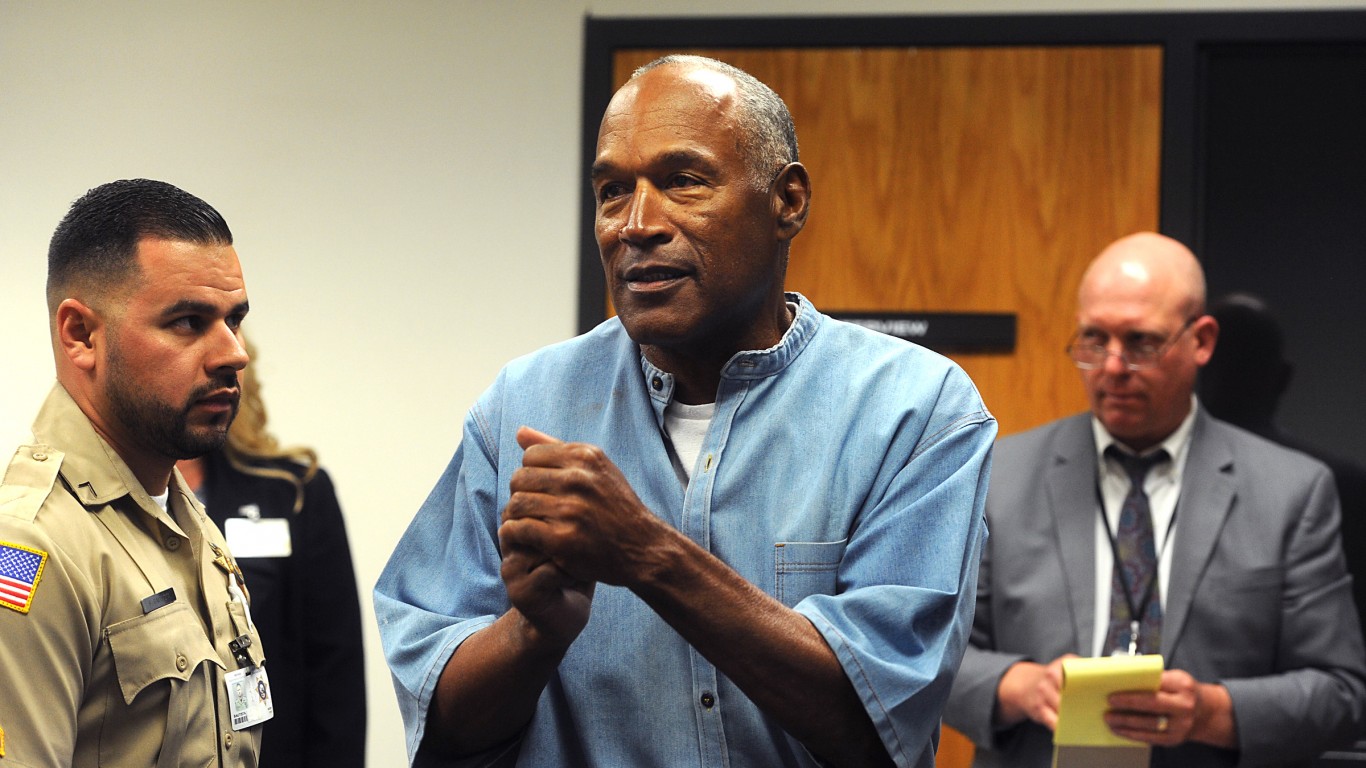
OJ Simpson
> Team(s): Buffalo Bills
> Convicted of: Robbery, assault, kidnapping
> Arrested in: 2007
> Sentence: 33 years
OJ Simpson was acquitted of a double homicide in one of the most high-profile criminal cases in recent history. Many in the nation were shocked that the superstar football player-turned actor and TV pitchman was accused of murder. Simpson had been out of the spotlight after the trial, but he was arrested for armed robbery, kidnapping, and assault charges in 2007. Simpson and armed accomplices held up sports memorabilia dealers in a Las Vegas hotel room as Simpson believed they had items that belonged to him. Convicted in 2008, Simpson was paroled in 2017 after serving the minimum of his nine-to-33 years sentence.
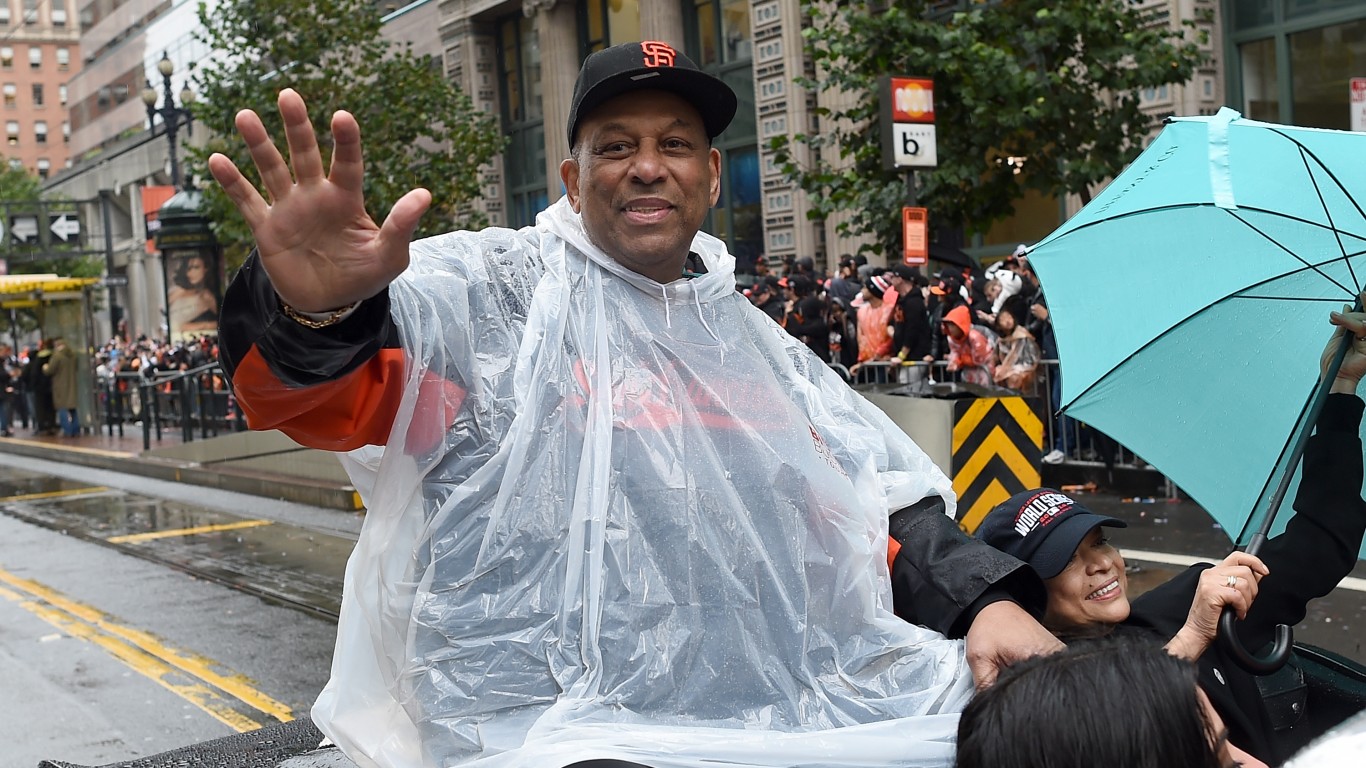
Orlando Cepeda
> Team(s): San Francisco Giants, St. Louis Cardinals
> Convicted of: Drug smuggling
> Arrested in: 1975
> Sentence: 5 years
Just a year after his career ended, former NL MVP Orlando Cepeda was arrested in his native Puerto Rico after picking up over 150 pounds of marijuana at an airport. Cepeda was sentenced to five years in prison, but he got out on parole just 10 months after going to prison.

Patrick Cote
> Team(s): Dallas Stars, Nashville Predators
> Convicted of: Robbery
> Arrested in: 2014
> Sentence: 30 months
During his NHL days, Patrick Cote was known as a tough enforcer. But his bad boy image may have gotten the best of him. In 2014, Canadian police found Cote driving a stolen car. After questioning, he admitted to robbing two different banks earlier that month and was later sentenced to 30 months in prison. This was hardly Cote’s first run-in with the law. He had a previous criminal record, including armed assault and drug charges stemming from a 2002 arrest in New York, when he was found with 30 pounds of marijuana.
[in-text-ad-2]
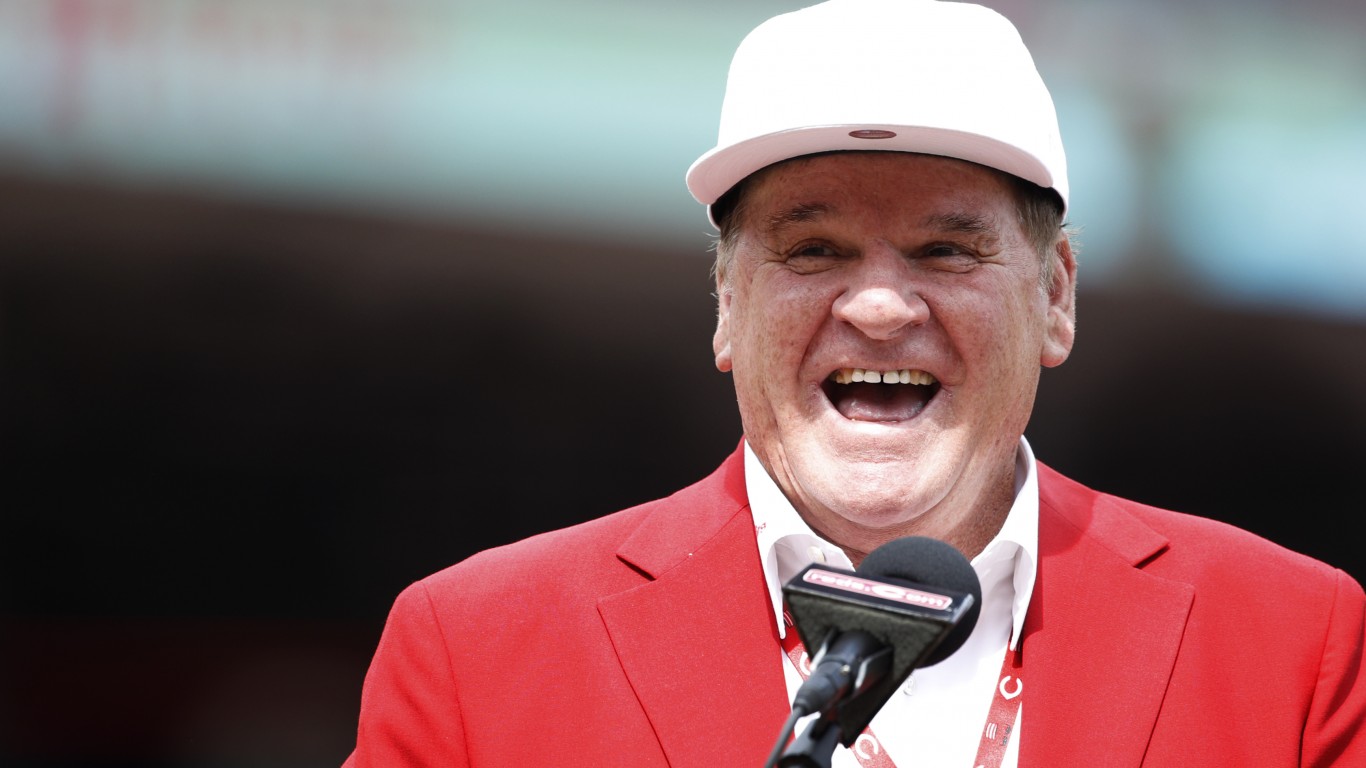
Pete Rose
> Team(s): Cincinnati Reds, Philadelphia Phillies
> Convicted of: Tax evasion
> Arrested in: 1990
> Sentence: 5 months
Since retiring as the MLB’s all time leader in hits, Pete Rose has consistently gotten into trouble. First, with Major League Baseball, Rose is banned from the game for life as a result of a baseball betting scandal. Rose also received a five-month prison sentence for tax evasion after the authorities said he did not properly report income he made from selling memorabilia and from betting on horse racing.
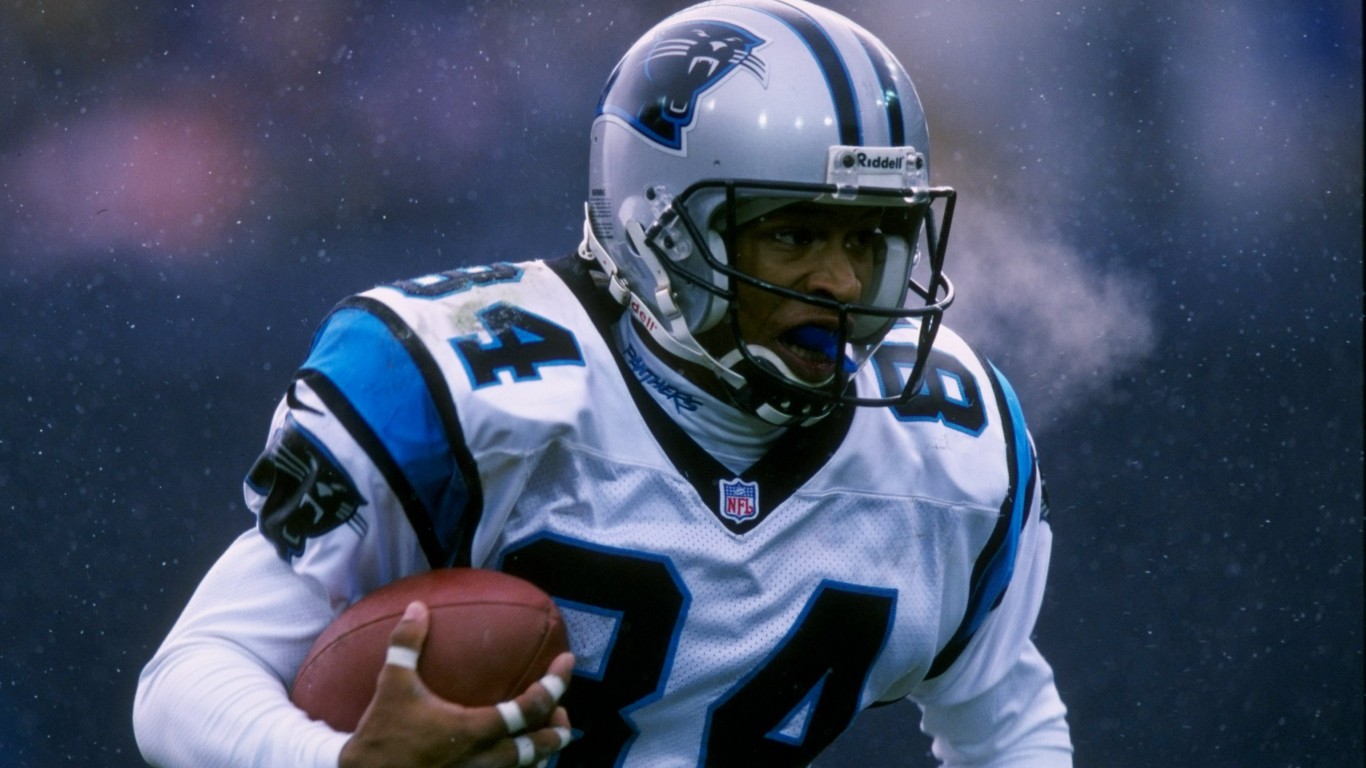
Rae Carruth
> Team(s): Carolina Panthers
> Convicted of: Conspiracy to commit murder
> Arrested in: 1999
> Sentence: 18-24 years
Rae Carruth seemed to be a promising young NFL player, drafted in the first round of the 1997 NFL Draft by the Carolina Panthers. But it all came crashing down in 1999. After impregnating his girlfriend Cherica Adams, Carruth hired two accomplices to kill Adams so he would not have to pay child support, according to prosecutors. A month after Carruth’s co-conspirators shot Adams she died from her injuries. Her son, Chancellor Lee Adams, was born prematurely as a result and has battled health issues since. Carruth was convicted in 2001 of conspiracy to commit murder, discharging a firearm into occupied property, and attempting to destroy an unborn child. He was sentenced to 18-to-24 years in prison and was released in 2018.
[in-text-ad]
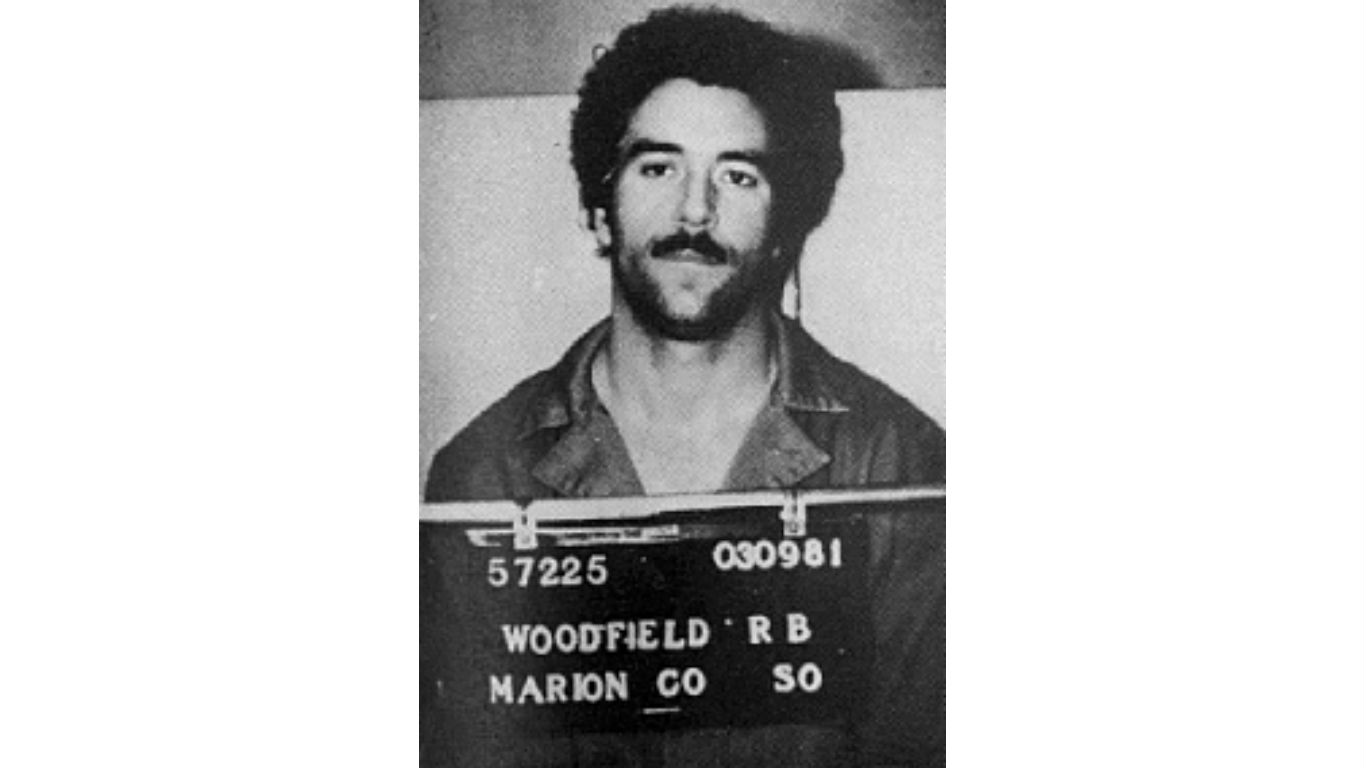
Randall Woodfield
> Team(s): Green Bay Packers
> Convicted of: Murder, attempted murder
> Arrested in: 1981
> Sentence: Life plus 90 years
Randall Woodfield was not a well-known athlete, drafted by the Green Bay Packers in the 17th round of the 1974 NFL Draft and cut during training camp. He later gained infamy as “The I-5 Killer,” one of the most prolific serial killers in U.S. history who found victims near the West Coast interstate highway. After a string of attacks, one witness was able to identify Woodfield out of a lineup. After he was arrested, police departments from all over Washington, Oregon, and California indicted Woodfield in their unsolved crimes. He was convicted of murder and received a life sentence. Some investigators say he killed at least a dozen women, and others estimate that he had over 40 victims, though the true count may never be known.

Ryan Leaf
> Team(s): San Diego Chargers
> Convicted of: Burglary, criminal possession of a dangerous drug
> Arrested in: 2012
> Sentence: 5 years
Going into the 1998 NFL Draft, there was one big question — who should be picked first overall, Peyton Manning or Ryan Leaf? Manning went first to the Colts and became one of the greatest QBs ever, while Leaf went to the Chargers and played just three NFL seasons. After his playing days, Leaf racked up a litany of criminal offenses in Washington, Texas, and Montana, including burglary and possession of a controlled substance. Leaf was imprisoned in 2013 after threatening a staff member at a Montana drug treatment center. He served a fraction of his five-year sentence, and as of 2019 he seems to have turned his life around. He was recently hired by ESPN as a commentator for college football.
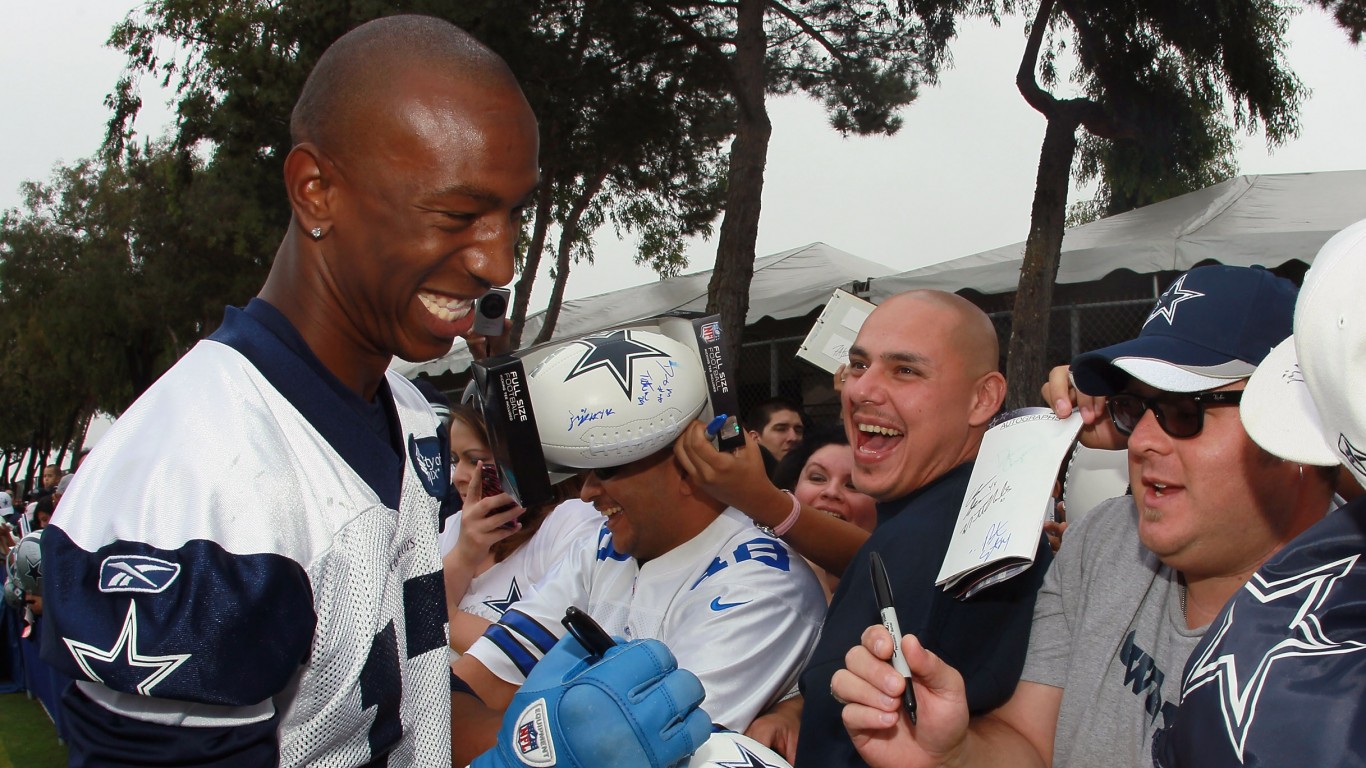
Sam Hurd
> Team(s): Dallas Cowboys, Chicago Bears
> Convicted of: Drug trafficking
> Arrested in: 2011
> Sentence: 15 years
Sam Hurd was a seldom-used wide receiver in his NFL career with the Dallas Cowboys and Chicago Bears. But off the field, authorities say he was working as a drug kingpin, operating a marijuana and cocaine network moving millions of dollars worth of drugs per month. Hurd was busted in a 2011 sting operation as he was trying to buy a kilogram of cocaine just days after playing in a game for the Bears. In 2013, he was sentenced to 15 years in prison.
[in-text-ad-2]
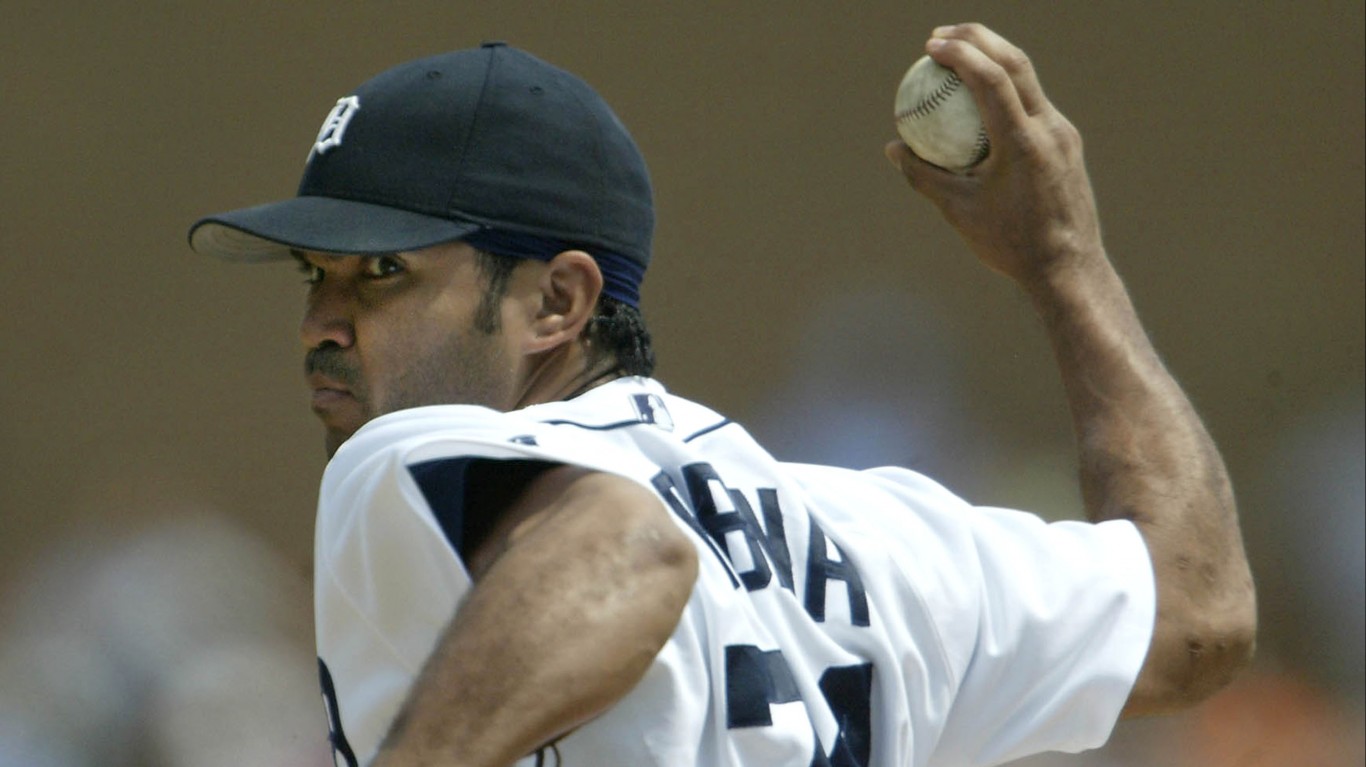
Ugueth Urbina
> Team(s): Montreal Expos, Florida Marlins
> Convicted of: Attempted murder
> Arrested in: 2005
> Sentence: 14 years
Ugueth was a quality relief pitcher in the MLB for many years, pitching for six teams, making two All-Star teams, and winning a World Series with the Florida Marlins. But his career came to a grinding halt after the 2005 season, when he was arrested in his native Venezuela on attempted murder charges. Workers on his ranch said Urbina and other men attacked them with machetes and tried to pour gasoline on them and set them ablaze after an argument. Though he initially denied involvement, Urbina was found guilty and sentenced to 14 years in prison. He served just over half of his term and was released in 2012.
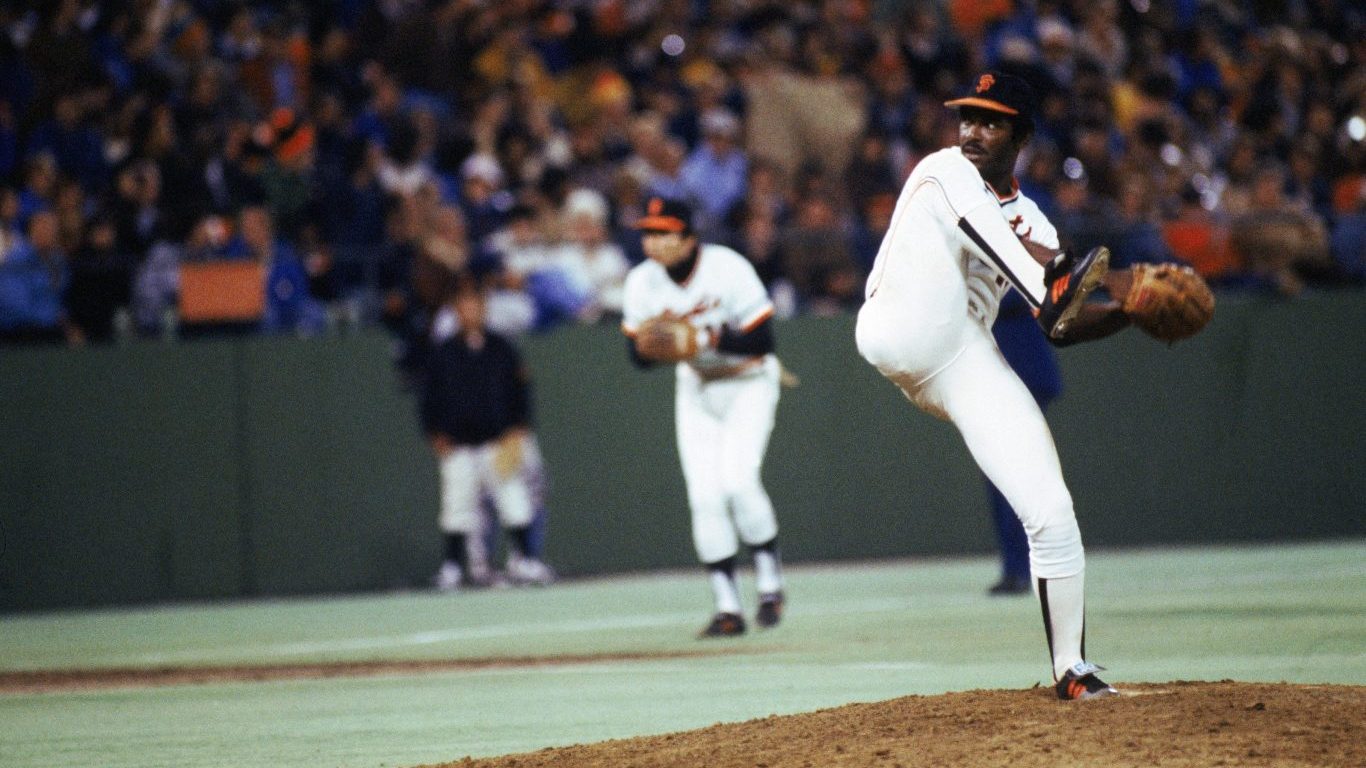
Vida Blue
> Team(s): Oakland A’s, Kansas City Royals
> Convicted of: Drug possession
> Arrested in: 1983
> Sentence: 1 year
Vida Blue was one of the most lauded pitchers of his day, making six All-Star teams, winning a Cy Young and AL MVP, and helping the Oakland A’s win three straight World Series titles from 1972 to 1974. But Blue, along with three other teammates on the Kansas City Royals, was caught up in a 1983 cocaine bust. He was caught with a tenth of an ounce of the drug and received a one-year sentence, nine months of which was suspended. Despite his sparkling career statistics and accomplishments, Blue has not been inducted into the MLB Hall of Fame, leading some to speculate whether his involvement with drugs is keeping him out of Cooperstown.
“The Next NVIDIA” Could Change Your Life
If you missed out on NVIDIA’s historic run, your chance to see life-changing profits from AI isn’t over.
The 24/7 Wall Street Analyst who first called NVIDIA’s AI-fueled rise in 2009 just published a brand-new research report named “The Next NVIDIA.”
Click here to download your FREE copy.
Thank you for reading! Have some feedback for us?
Contact the 24/7 Wall St. editorial team.
 24/7 Wall St.
24/7 Wall St. 24/7 Wall St.
24/7 Wall St.

